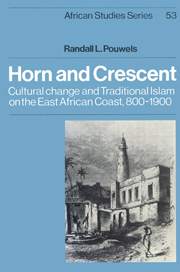Book contents
- Frontmatter
- Contents
- List of illustrations and maps
- Preface
- List of abbreviations
- Introduction
- 1 The roots of a tradition, 800–1500
- 2 The emergence of a tradition, 900–1500
- 3 A northern metamorphosis, 1500–1800
- 4 Town Islam and the umma ideal
- 5 Wealth, piety, justice, and learning
- 6 The Zanzibar Sultanate, 1812–88
- 7 New secularism and bureaucratic centralization
- 8 A new literacy
- 9 The early colonial era, 1885–1914
- 10 Currents of popularism and eddies of reform
- Notes
- Glossary
- Bibliography
- Index
4 - Town Islam and the umma ideal
Published online by Cambridge University Press: 23 September 2009
- Frontmatter
- Contents
- List of illustrations and maps
- Preface
- List of abbreviations
- Introduction
- 1 The roots of a tradition, 800–1500
- 2 The emergence of a tradition, 900–1500
- 3 A northern metamorphosis, 1500–1800
- 4 Town Islam and the umma ideal
- 5 Wealth, piety, justice, and learning
- 6 The Zanzibar Sultanate, 1812–88
- 7 New secularism and bureaucratic centralization
- 8 A new literacy
- 9 The early colonial era, 1885–1914
- 10 Currents of popularism and eddies of reform
- Notes
- Glossary
- Bibliography
- Index
Summary
Laʿilmu ridda illaʾ llah (Any knowledge save that of God is apostasy). Such is the view of a mwanachuoni mkubwa (‘big’ ʿalim) concerning the inclusion of ancestral spirits, territorial spirits, or saint worship in Islam. Such views might be encountered anywhere in the Islamic world, for everywhere within it, ‘high’ Islam, reflective of an absolute view of transcendence, and ‘popular’ Islam, which often treats transcendence merely as being relative, are to be found coexisting in single communities. The implicit antagonism between these two cosmic dispositions has produced widely divergent opinions within Islamic communities concerning what sins one can commit and still be accepted as a Muslim. In the century or so after the Prophet Muhammad's death, opinions on these questions varied greatly from the relative tolerance of early Shiʿites to the highly exclusive views of some Khariji groups. In spite of these differences, all Muslims shared one common notion: the idea that certain enlightened personalities or societies enjoy God's special favour, and that for one to expect eternal salvation he must attach himself to these individuals or communities. Muslim theologians, however, learned to deal with such religious differences among the Faithful by ‘leaving’ the final judgement in such matters to God (that is, constituting the thesis of ‘suspended judgement’). Out of this developed the conviction that, through a condign and enlightened leadership, God extends his special dispensation to all members of the Islamic community (umma).
- Type
- Chapter
- Information
- Horn and CrescentCultural Change and Traditional Islam on the East African Coast, 800–1900, pp. 63 - 74Publisher: Cambridge University PressPrint publication year: 1987



